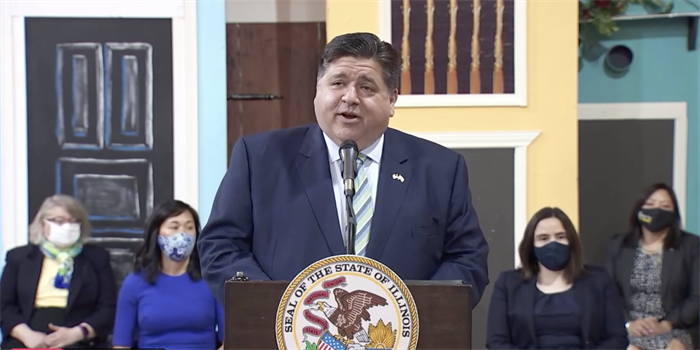photo credit: Illinois.gov)
By TIM KIRSININKAS
Capitol News Illinoi
SPRINGFIELD – Gov. JB Pritzker announced Monday the state will plan to “phase out” its moratorium on pandemic-related evictions by August and launched a new program to provide assistance to renters and homeowners financially impacted by COVID-19.
The announcement regarding the planned end of the eviction moratorium came as Pritzker signed House Bill 2877, a bill that expands the Illinois Rental Payment Program to a total of $1.5 billion, and requires the sealing of eviction records filed due to financial hardship through August of 2022.
Funding for the program, which has been made available by the federal government, will be administered through the Illinois Housing Development Authority.
The assistance is nearly four times the amount offered under the previous assistance program, which distributed more than $280 million to more than 260,000 households across the state that were financially impacted by COVID-19, officials said.
Through the bill’s signing, eligible tenants and landlords can apply to receive a one-time grant totaling up to $25,000 to cover a maximum of 15 months of missed rent from June 2020 through August 2021, or until funds are exhausted. Funds will be distributed directly to housing providers and landlords.
Speaking in a Monday news conference in Chicago, Pritzker called the launch of the new support program and bill signing “momentous,” as officials aim to provide additional assistance to over 120,000 households statewide.
“The Illinois Rental Assistance Program is a testament to how good government can make a life-changing difference for people when our dollars follow our values,” Pritzker said Monday. “This program expansion will allow us to take that impact to new heights for tens of thousands of Illinoisians.”
In order to receive assistance through the Illinois Rental Payment Program, tenants must be able to prove financial difficulty as a result of COVID-19, provide proof of housing instability due to missed rent, and have a household income below 80 percent of their area median income. Eligible tenants and landlords can apply to receive assistance at illinoishousinghelp.org.
Rep. Delia Ramirez, D-Chicago, chief sponsor of HB 2877, said the legislation is “a critical first step” to avoiding a housing crisis as a result of the pandemic.
“The provisions in this bill will ensure that the federal rental assistance is administered effectively and efficiently while targeting those most in need,” Ramirez said.
Ramirez said the sealed eviction record provision is key to providing “a clean slate” for renters who may have lost their homes and allow them to find stable housing in the future.
According to information from the Illinois Department of Human Services, an estimated 60,000 Illinois households are vulnerable for eviction in 2021 as a result of the pandemic.
Pritzker has issued monthly executive orders prohibiting evictions due to pandemic-related financial hardship since March of 2020.
According to Housing Action Illinois, the bill requires the sealing of all eviction records between March 2020 and March 2022 upon filing, with limited unsealing allowed if a judgment is entered and the case is unrelated to nonpayment of rent.
The bill also requires the sealing of older eviction records if the court finds that doing so is in the interests of justice, the case is dismissed, the tenant did not breach the lease, or the parties agree to seal the record. The provision sunsets on July 31, 2022.
Bob Palmer, policy director for Housing Action Illinois, said in a phone call that the governor’s announcement regarding the eviction moratorium was expected as the state has met adequate criteria to do so. But he also said his organization would continue to advocate for phasing out the moratorium in a responsible manner.
Palmer added the new round of assistance would be important to continue to support renters and homeowners facing financial challenges due to the pandemic.
“We knew this was coming sooner rather than later,” Palmer said. “We look forward to IHDA and the Illinois Department of Human Services getting as much of that rent assistance out as possible between now and August.”
“We’re going to be developing some recommendations for his office about how to responsibly (lift the moratorium),” he added. “We will ask his office continue to monitor the status of that pandemic and ask them to reevaluate that decision based on current public health needs and how well IHDA is able to get these rental assistance dollars out.”








